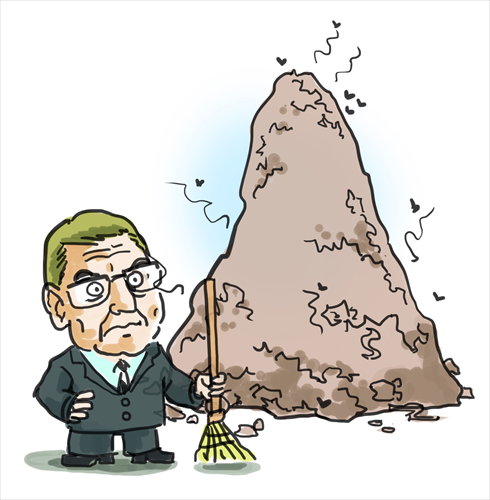Defense secretary shift brings little change to US foreign policy

Illustration: Liu Rui/GT
Plus ca change, plus c'est la meme chose, "the more things change, the more they remain the same," is an old cliché in both French and English by now. I was reminded of how little and how much the phrase tells us when reading commentary on the proposed replacement of secretary of defense Chuck Hagel by Ashton Carter. The Washington insiders have been profligate with gossip poorly disguised as analysis. According to them, Hagel was forced out by the tightly united White House officials who manage foreign policy.
The insiders, or rather the Washington correspondents who hang on their words, have given us sharply contradictory accounts of what bothered the White House about Hagel. One story is that he was too passive, made little or no impact, and could not master the strong inertial forces of his department's bureaucracy.
Another is that he stubbornly resisted both the admirals and generals and White House officialdom in refusing to allow any escalation of a limited engagement in the Middle East; the sort of engagement promised to the restive American public, which is deeply disturbed by the advance of the Jihadist groups terming themselves the new caliphate but no less disturbed at the thought of an endless war and its cost.
That interpretation would have given Hagel a faintly heroic cast, as someone seeking to avoid disasters on the order of the Vietnam War, in which he actually fought.
No matter, the ritualized burial of Hagel has now been followed by a no less ritualized welcome. Ashton Carter, nominated as his successor, is expected to be confirmed by the Senate with a large bi-partisan majority. Carter, a physicist and former Harvard professor, consultant to the arms manufacturers and Pentagon contractors, has had any number of Defense Department posts before.
He has just benefited from a very positive portrait sketched by the senior reporters of The New York Times Washington bureau, who credit him with the capacity and the intention to guide the president toward a larger military intervention in the Middle East. Their analysis preceded by a day the failure of an attempt to rescue hostages in Yemen by US special forces, a failure which resulted not only in the deaths of the hostages but also in the reported deaths of Yemini civilians.
The situation in the Mideast is a continuing disaster for the US. US policy there has two aims. One is to stabilize the region. The second is to support the forces of pluralism and secular modernity. The aims are incompatible but that hardly matters since neither is attainable by any military or political measures within US capability. Indeed, US support of Israel in spite of the occupation of Palestine, which inflames Arab and Muslim hostility the world over, is a major contribution to Mideast instability.
It is true that US President Barack Obama, by persisting in negotiations with Iran despite strong opposition in the Congress, has shown a decent minimum of rationality. The policy is singularly unconnected to a larger American design for the region, no doubt because that would involve a systematic reduction of our presence.
A similar fatality now marks the US relationship with Russia. US intervention in Ukraine, with half willing, half skeptical Western European allies, totally destabilized that unhappy nation's fragile politics. It also convinced Russian President Vladimir Putin and much Russian opinion that the US intended to destabilize Russia itself.
Despite the entirely vicarious heroism of US Congress members and European commentators, the present US government is very unlikely to move toward military confrontation with a nuclear-armed Russia. The US cannot move either forward or backward and its strongest but also most independent European ally, Germany, is desperately attempting damage control.
The US belief in our indispensability, our duty and right to intervene in every global conflict and region - regardless of what other nations may think - is the one constant in our foreign and military policy. Obama has his doubts, or did before he became president. Today, what he thinks is not totally irrelevant, but it is one factor among many in the making of US policy.
In this situation, to expect a new course from a familiar and totally interchangeable Washington figure like the newly nominated secretary of defense would be absurd.
The secretary may or may not be able, in the face of the internal and external lobbies and pressure groups, the careerist, economic and institutional interests shaping the military budget, to achieve even the appearance of command. He would be unusually successful were he to terminate some of the department's less rewarding projects, like the new fighter-bomber, which is kept on the ground because it is too unsafe to fly.
We are on the threshold of an expensive and exhausting presidential campaign. The candidates who seek a serious recasting of our foreign and military policy (Senator Rand Paul as a Republican and former Senator Jim Webb and present Senator Bernie Sanders among the Democrats) are unlikely to be nominated.
The new defense secretary will be forgotten as soon as he leaves office. He too is intelligent, and he must be asking himself if he will be forgotten even before that.
The author is professor emeritus of Georgetown University Law Center. opinion@globaltimes.com.cn